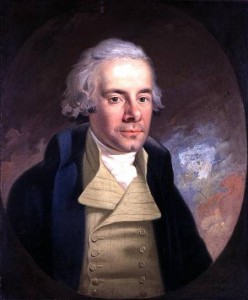Dr Philip J. Sampson, Fellow of the Oxford Centre for Animal Ethics, uncovers the spiritually corrosive effects of hunting. He reveals a strong evangelical tradition of opposition towards cruelty and the embracing of kindness and gentleness to all creatures.
Modern Evangelicals and Hunting
In 1963 Gavin Maxwell, author of Tarka the Otter, described how a minister of the Church of Scotland had killed two otter cubs with a shotgun as they played on the seashore. Maxwell protested, but the minister reminded him that the “Lord” gave man dominion over animals[1]. Now this was more than 50 years ago, and times have changed. Admittedly, the current Archbishop of Canterbury has been bird shooting for fun, but the days of the hunting priest are largely over. Hunting is now rarely defended biblically in Britain, and few Christians see it as a spiritual matter.
 Things are different in North America where hunting is popular among evangelical Christians, many of whom see it as authorised by the bible, especially by the doctrine of dominion. Moreover, many find a moral value in hunting, praising the bonding experience between fathers and sons (sic), and the transmission of Christian wisdom to the next generation. For example, evangelical leader James Dobson speaks warmly of hunting trips with his father; and Doug Phillips, a former conservative evangelical leader, believes that teaching a boy (sic) to hunt prepares him ‘to be a better man’. But Phillips emphasises that this is a spiritual, not just a moral matter. When we train a boy to hunt, he says, ‘we advance the Kingdom of God because we are obeying the dominion mandate of Genesis… we strike a blow against the Devil!’[2].
Things are different in North America where hunting is popular among evangelical Christians, many of whom see it as authorised by the bible, especially by the doctrine of dominion. Moreover, many find a moral value in hunting, praising the bonding experience between fathers and sons (sic), and the transmission of Christian wisdom to the next generation. For example, evangelical leader James Dobson speaks warmly of hunting trips with his father; and Doug Phillips, a former conservative evangelical leader, believes that teaching a boy (sic) to hunt prepares him ‘to be a better man’. But Phillips emphasises that this is a spiritual, not just a moral matter. When we train a boy to hunt, he says, ‘we advance the Kingdom of God because we are obeying the dominion mandate of Genesis… we strike a blow against the Devil!’[2].
Such views are not restricted to the conservative fringe. Hunting, says Southern Baptist Gary Ledbetter, is part of the evangelical culture[3]. In 2007, Mike Huckabee, former Southern Baptist minister and prospective Presidential candidate, described his hunting success to an NRA conference: ‘And somehow, by the grace of God, when I squeezed the trigger, my Weatherby .300 Mag …did its work, and somehow the angels took that bullet and went right to the antelope, and my hunt was over in a wonderful way.’ Huckabee explicitly narrated his hunting as a spiritual experience, and commentators saw this as enhancing his appeal to the evangelical constituency whose political support he sought[4].
This view of hunting assumes firstly, that hunting can play an important moral role in bringing up children, specifically boys; and secondly, that hunting itself is a spiritual matter. This sounds strange to UK ears, yet these assumptions are not peculiar to modern evangelicals in the US; they have in fact been common for many centuries. However, Christians of the past drew quite different conclusions about both the moral and spiritual dimensions of hunting.
Hunting and Raising Children
From the classical world of Greece and Rome to the Darwinism of the early 20C, hunting was valued for preparing a boy for a competitive world, and for inculcating “fighting, masterful virtues” and “vigorous manliness” as President Theodore Roosevelt put it[5]. In particular, hunting was valued to prepare the warrior for the battlefield. As Plutarch observed, it inures men to the sight of ‘wounds and blood of slaughtered beasts’, hardening the heart against pity[6]. Indeed, when William Wilberforce supported a bill to outlaw blood sports in1802, militarily minded Parliamentarians claimed that such a ban threatened the ‘martial ardour of the nation’ and British success in war[7].
However, from the days of the early Church, Christians had pioneered a different vision. By the medieval period, hunting by the laity was discouraged, and it was forbidden to the clergy except for the military orders whose lion hunts maintained their warrior skills. But the most outspoken opponents of hunting were the predecessors of today’s evangelicals. If hunting hardened the heart, they did not regard this as a virtue. Hunting, lamented the seventeenth century Puritans John Dod and Robert Cleaver, ‘maketh not the heart pitiful and mercifull; but it hardeneth the heart, and infecteth it with crueltie.’[8] They thought this a poor way to bring up children, and not just on moral grounds.
The Spirituality of Hunting

William Wilberforce
The fact is that, from John Calvin to William Wilberforce, the forebears of today’s evangelicals regarded hunting as a spiritual peril, and treated it with deep suspicion. Hard heartedness was a spiritual not just a moral fault, just as pity and mercy are spiritual virtues. As the great nineteenth century Baptist preacher C H Spurgeon declared, ‘in gentleness and kindness our great Redeemer is our model’. John Bunyan, best known as the author of The Pilgrim’s Progress, tells us that his evangelical conversion was accompanied by ‘a very great softness and tenderness of heart’, nurtured by a sermon on the love of God[9]. The love of God and the example of Jesus are to guide Christian spiritual experience; and this guidance is to begin with Christian leaders. Some evangelicals were very outspoken about this. For example, the eighteenth century hymn writer William Cowper calls the ‘cassock’d huntsman’ a ‘designing knave, a mere church juggler, hypocrite, and slave’ who seeks the approval of his social ‘superiors’ and leads his flock or congregation astray[10].
This view of hunting stemmed from a deep familiarity with the Bible for, as Philip Stubbes observed in 1583, there are many hunters found in its pages but none is righteous[11]. Indeed the list of biblical hunters is formidable, including Cain, Nimrod, Ishmael, Esau, the rider of the white horse in Revelation chapter six, Herod and the devil[12]. None advance the Kingdom of God; quite the opposite. Indeed, both fierceness and vulnerability among animals are products of the Fall, not of grace. Thus, before the nineteenth century, evangelicals often identified the hunted animal of Psalm 22 with Jesus, and the hunters with his persecutors. This biblical view of hunting was taken to North America by the Puritan settlers, and was commonplace there for nearly two hundred years. The hunting myth beloved of today’s North American evangelicals emerged only in the late eighteenth century, when hunting became a good preparation for war in the conflict with the English Crown; it was subsequently reinforced by Darwinism in the early twentieth century, and now dominates evangelical opinion[13].
For evangelicals, the shepherd, not the hunter, should point us to God. Indeed, the biblical list of shepherds is as distinguished as that of hunters is notorious: Abraham, Jacob, Rachel, Moses, David, Jesus, and according to the 23rd psalm and elsewhere, God himself. The good shepherd, says Jesus, has a kindly heart towards his sheep and even gives his life for them[14]. Only the wicked shepherds of Ezekiel 34 hunt and eat the sheep.
The Kingdom of God
The indifference towards hunting of British Evangelicals is a recent attitude; following Proverbs 12.10, evangelicals previously saw kindness and gentleness as fruit of the spirit, and rejected pleasure in suffering and death as wickedness. In the Kingdom, not even wolves will hunt (Is. 11). If God has compassion on all he has made (Ps 145.9), how can his servants do less?





